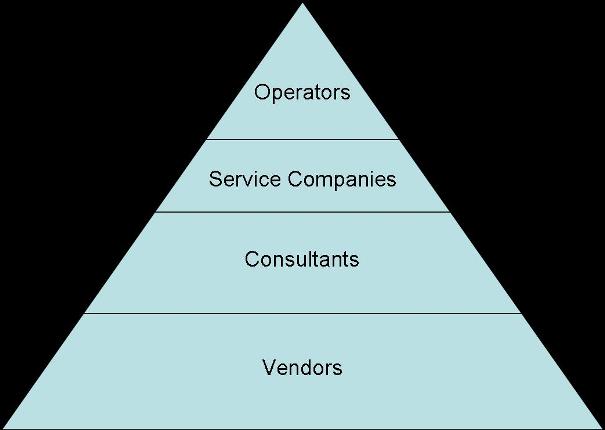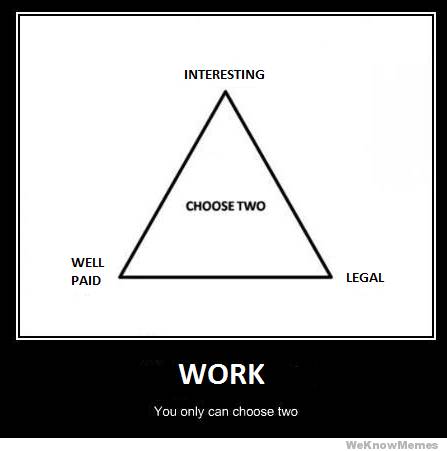Why I Quit My High-Flying Job And Said NO To A 6-Figure USD Promotion
It was a contrarian move. But I never regretted it.
When I was 22 years old, my classmate Andy and I built 8-bit computers using small electronic chips. (The computers were designed by other people; we just followed the plans).
This was for our final year engineering project.
Andy posted details about our mini-computers online, and someone from an unknown startup called Google commented on the website – asking if we wanted to join his team.
At that point in time (it was 2006), I had never heard of Google.
I thought Yahoo! would rule the Internet, but that Altavista was actually better.
Furthermore, my one-track mind was set on working for the national oil company PETRONAS – because I had a contract with them. Google could have probably bought me out instantly if I impressed them, but I was too silly to realise that.
That one-track mind led me to skip interviews from two other companies. What was the point? I was going to join PETRONAS anyway.
So I never responded to that guy from Google.
If you get an offer from Google, you should probably take it!
Two years later, I was frightened about where my career in PETRONAS was heading. So I thought about my old friend from Google (who was probably filthy rich now) and wrote back to him; telling him a sob story on why I now wanted to join Google.
He never responded either.
Damn you karma!
Instead, I resigned, took a 16% pay cut, and went to work for an oilfield service company. If you’re unfamiliar with the upstream oil industry, there are a few segments in the market.
At the very top are the oil companies.
These are usually huge multinationals with lots of assets; like Exxon, Shell, and PETRONAS. People want to join these companies because they pay well, are generally stable and offer great benefits.
Oilfield service companies are the second tier.
They provide equipment and services to the oil companies. Oilfield service companies pay well too, but they’re quicker to lay people off when business is down. Some companies have a reputation for treating people like slaves. One of those “slave driver” companies asked me to go for an interview back in uni. I didn’t go either.
F#$k you SLB!
But anyways, why I'm telling you this is the decision to leave a "secure" job with an oil company and work for a service company (for 16% less pay too) — would be viewed as weird by an oil insider.
It was a contrarian move.
People in service companies usually want to move to oil companies – not the other way round.
Some people who’ve read my “How I Paid Off My 58K Education Loan” story have asked me: “Why did you leave PETRONAS? So many people want to get in…”
I’m guessing that for a lot of Malaysians – PETRONAS seems like a dream company.
Someone even commented, “What a shame… He broke his contract and had to resort to tricks to pay off his debt…”
But I never regretted it.
In fact, by all conventional salaryman standards, my move would be viewed as a success. Two promotions within the first five years and significant jumps in salary; I was a regional manager when I was 28 years old.
At the oilfield service company — with a respected position, money and frequent air travel — what I had was somebody's dream job!
The official title was “Asia Pacific Product Line Manager.”
I was in charge of selling high-tech equipment to clients, executing projects safely, and growing revenues and profits. My area of coverage was from Bangladesh to New Zealand.
Over the years, people would often ask me, “What do you do for a living?” and I would squirm uncomfortably as I looked for the right words. Maybe I never got used to the idea that I was supposed to be a leader. Even my mom never really understood my job.
Anyway, since it’s all behind us now and I’m becoming a more shameless blogger by the day: Mom, I was really the boss of a >10 million USD business!
I used to travel too. In fact, I wrote a lot of this from the business class section of MH132 Auckland – Kuala Lumpur. (We always travel economy class, but as fate would have it, I got upgraded – on my last business trip).
For the past three years, I’ve done somewhere between 1 to 3 international trips every month. I’m not a huge fan of travel, but have managed to slip in bucket list items like exploring the red light district in Amsterdam; surfing the waves at Gold Coast, Australia; and watching the LA Lakers at Staples Center.
The money was good. I had a great boss and employees. And some genuinely good friends within the company.
I guess a lot of people would call it their dream job.
But it wasn’t mine.
Why I left
At this point in most “Why I Quit My Job” articles — the author goes on to tell you all the things they had to sacrifice for their careers. That they worked themselves into sickness, couldn’t have meaningful relationships, and got addicted to alcohol.
I hate to disappoint — but that isn’t where this story is going.
Actually, the higher I climbed the ranks — the better my life got. I had more control over my time — which apart from watching too many Thug Life videos — I generally put to good use. I used the extra money responsibly. And I learned a lot of things about business, leadership and life. I was generally happy too.
So why did I decide to leave?
I left because it wasn’t enough.
The push factor — the temperamental oil market
In December 2014, the oil market crashed. Oil was trading above USD 100/barrel in June 2014. By December, it had fallen to half its value.
(Right now, in May 2016, for the first time — it has broken through USD50 a barrel).
Oil companies started delaying and canceling projects. That meant the contractors that served them (like my ex-company) had less and less work.
Less work meant restructuring — reducing the number of employees to match expected earnings. But I was used to restructuring by then. The company had been restructuring a lot over the past two years — even before oil prices crashed. It was starting to wear on me; I had questions about whether the company or even the industry as a whole was sustainable.
(PS: Never thought I’d see this, but it looks like solar energy might become cheaper than oil & gas in our lifetime).
Somewhere in the middle of 2015 — I realised I didn't really enjoy my work anymore. And I say this with the realisation that nobody enjoys 100% of what they do.
But the idealistic me believes that people should at least like their jobs, and believe in the company they work for.
And they need to believe in their work.
What I really wanted to do
In my previous job — my ultimate responsibility was to make money.
I don’t think I was bad at it. If you ask my ex-bosses, they’ll probably tell you that I was a great manager, though not a great salesman.
But what I really wanted to do; what I think I would have been really good at — was to be in people development. The “HR” side of things.
And so, for the past few years — I was vocal about wanting to move into a Learning & Development role. I told my bosses and colleagues about it. And it went into my yearly Career Development Plan.
But perhaps what sealed the deal for me was the oil market crash. In such difficult times, “non-essential” roles like Learning & Development weren’t being created; they were being cut.
I was still safe where I was — because my business was making money.
But I realised I might never get my “dream” role in the company. And even if I eventually did — it might not be secure.
You will be tempted
There was another dilemma.
My boss and his bosses had been talking about giving me a promotion: same job scope — but a larger area of responsibility. One afternoon, the vice president (of my group) verbally offered me to take a higher position in the organisation; in front of two other bosses.
I couldn’t hide the troubled look on my face. Sensing my hesitation, they asked: “We’re curious… what are your concerns?”
“I’m kinda thinking of leaving…” I stammered.
Maybe you think that I’m too arrogant and idealistic for my own good. That I should have been grateful for the opportunity, shut up, and taken the money. I was grateful — but I knew that No was the right decision. For me.
Because I think the whole idea of “tolerating” a day job, using money and the periodic vacation as motivation is a bullshit way to live. I believe people can find work that makes them feel alive. But it takes serious work to find the right fit for their character.
I’d rather find meaningful work and work till I die, than desperately long for retirement — while I do something that kills me.
Quit like a boss
After multiple discussions with my boss, I submitted my resignation letter in the last week of December 2015.
(Looking back, that was bad timing. I might have been able to engineer a nice redundancy payment if I had been more patient).
My boss asked me to reconsider. They would give me another huge bump. If I agreed, it would have been a six-figure USD annual salary. Which is pretty nice for living in Malaysia.
But strangely — I didn’t think of all the Rolexes I could buy, the EuroTrips I could take and the champagne-loving party girls I could help get drunk.
Instead, I thought about how at 32 years old — I didn’t have that much time left. It was time to do what I really wanted with my life.
So I said no in the most respectful way I could. And I quit.
Check your privilege, improve your situation
Read enough Business Insider Facebook posts, and you’ll start seeing a trend.
There’ll be enthusiastic supporters saying: “Wow, thank you for sharing!” There’ll also be: “Of course he could do it. He had daddy’s money/political connections/White privilege/…” comments.
So before I go any further, I’d like to disclose my privilege.
I grew up in a middle-class family. My parents were professionals. I had time to read, play music and concentrate on studying. Nowadays I stay alone and have no dependents.
I acknowledge that maybe a person who has to feed a family couldn’t do what I did. Or even a person who’s getting married in six months.
At the same time, I’ll take responsibility for engineering a life where I could do exactly what I did: I lived below my means. I never took on too much debt (just my apartment). I found a way to pay off my education loan and didn’t buy an expensive car. And I always took the time to think about what work makes me happy. I experimented too… That’s why my blog mr-stingy exists; writing makes me happy.
Only a fool would say privilege and upbringing aren’t advantages in life. But one’s situation — given enough time and effort — that’s something that can be changed.
My new job — a social enterprise
I recently started my new job at a social enterprise called Leaderonomics.
If you haven’t heard about social enterprises before, they’re businesses which prioritise social work as much as profit. Conventional businesses prioritise profits, then worry about corporate social responsibility (CSR). On the other end of the spectrum, non-profit organisations prioritise charity work — but may not be financially sustainable. A social enterprise is somewhere in the middle.
My job is to work with college students — to help them develop leadership skills. And I get to spend 20% of my time tinkering with social media/digital marketing. I don’t do much that’s related to my engineering degree anymore. But hopefully my experience in the oil industry and my blog will help me in my new job.
I took a huge pay cut to be here; it’s even less than my salary back in 2013. But a few weeks in, I get the feeling I’m exactly where I should be.
Maybe six months from now, I’ll be broke, unhappy, and spamming LinkedIn messages to Shell HR every day. I can't say for sure.
Before I quit, I was really scared that it was the wrong decision to make. I still am. But from experience, I know this to be true:
If you want a meaningful life — you have to **work hard* at finding it. You may have to make questionable decisions that no one else understands. It may take years, only for you to realise that you need to do something else. There’s also no guarantee at the end that you’ll find what you’re looking for, that you’ll be happy, or that you’ll be rich.
Maybe you’ll find it in starting your own company or movement. Or in working for someone whose vision you share. **Everyone finds meaning differently.
But if you choose the path less traveled; the path where you have to face your darkest fears, as you struggle in the darkness, you’ll remember that man *(or woman, for that matter) wasn't born to merely survive in this world. But to do great and wonderful things, in the pursuit of happiness.
That’s the dream I wake up to every morning now.
The dream of feeling alive.
I hope you find it too.
PS:
Andy is now a senior R&D engineer at a semiconductor multinational corporation. He continues to do really impressive stuff with electronics.
Google (a.k.a. Alphabet Inc.) is now worth about USD 500 Billion. The median yearly salary for a Google hardware engineer is about USD 127,000.
I’m still making questionable decisions with my life.
The full article originally appeared on mr-stingy.com.
This story is the personal opinion of the writer. You too can submit a story as a SAYS reader by emailing us at [email protected].
Read more SAYS stories from Aaron, here:






